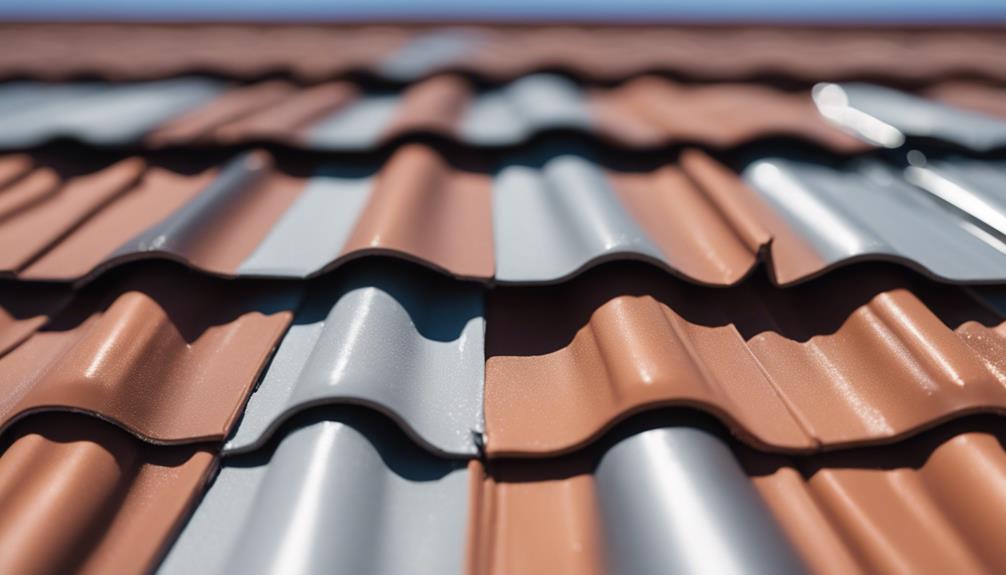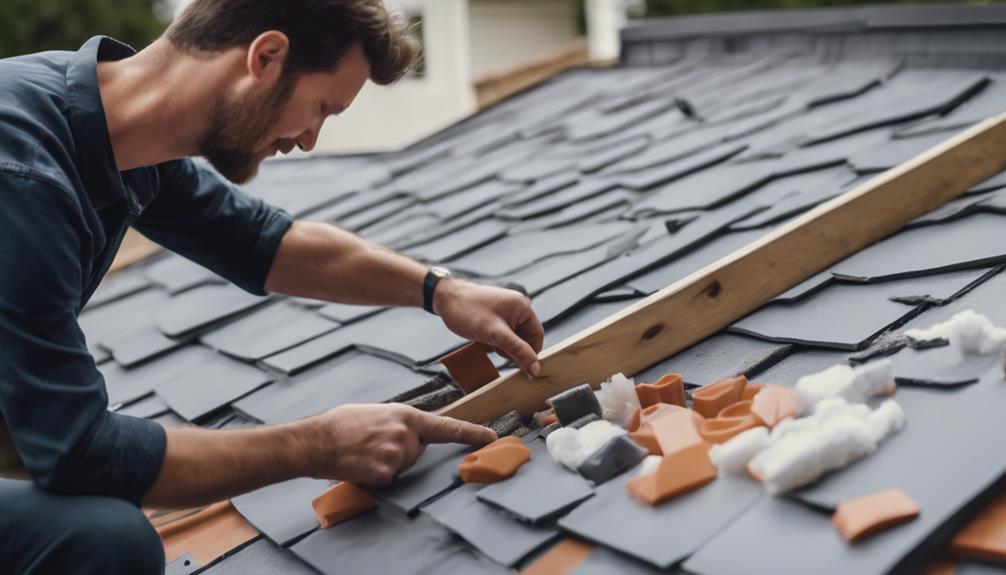Choosing the Right Sealant for Your Roof
Take a crucial step in safeguarding your roof by learning how to select the perfect sealant - your roof's fate depends on it!
Selecting the appropriate sealant for your roof is a decision that can greatly impact the longevity and durability of your property's primary defense against the elements. The type of sealant you choose can mean the difference between a secure, weather-resistant roof and one vulnerable to leaks and structural issues.
Understanding the nuances of different sealant options and how they interact with varying roof materials is essential in making a well-informed choice. Stay tuned to uncover the key factors to take into account when maneuvering the intricate process of selecting the right sealant for your roof.
Types of Roof Sealants
When considering the types of roof sealants available, it is essential to understand the distinctions between silicone sealants, acrylic sealants, and polyurethane sealants.
Silicone sealants are known for their exceptional durability and weather resistance. They remain flexible over a wide temperature range, making them suitable for various climates.
Acrylic sealants, on the other hand, are cost-effective and easy to apply. They offer good adhesion to different surfaces and are paintable, allowing for color matching with the roof. Acrylic sealants are commonly used for minor repairs and maintenance.
Polyurethane sealants provide excellent UV resistance and are highly durable. They can withstand foot traffic and harsh weather conditions, making them ideal for high-traffic areas on the roof.
Understanding the unique properties of each type of sealant is important in selecting the most appropriate one for your specific roofing needs.
Factors to Consider
In evaluating the most suitable roof sealant for a specific project, it is imperative to carefully assess several key factors that encompass durability, application method, and compatibility with the roofing material. Durability is an important consideration, as the sealant needs to withstand various weather conditions and temperature fluctuations over an extended period. Factors such as UV resistance, flexibility, and resistance to cracking play a significant role in determining the longevity of the sealant.
The application method of the sealant is another critical factor to take into account. Some sealants require specialized equipment for application, while others can be applied using standard caulking guns. Understanding the application requirements can help guarantee a smooth and efficient sealing process.
Compatibility with the roofing material is essential to prevent any adverse reactions that could compromise the integrity of the roof. Different sealants are designed to work with specific roofing materials such as metal, asphalt, or concrete. Ensuring compatibility will help maintain the structural integrity of the roof while providing effective protection against leaks and water damage.
Choosing Based on Roof Material

Selecting the appropriate roof sealant is contingent upon the specific characteristics of the roofing material in question, necessitating a meticulous assessment of compatibility and performance requirements.
When choosing a roof sealant based on the material of your roof, consider the following:
- Asphalt Shingles: Opt for sealants compatible with asphalt and that can withstand the expansion and contraction that occurs with temperature changes.
- Metal Roofs: Select sealants that can adhere well to metal surfaces and provide protection against corrosion.
- Tile Roofs: Choose sealants that are flexible to accommodate the movement of tiles and resistant to UV radiation.
- Flat Roofs: Look for sealants specifically designed for flat roofs, ensuring they offer excellent waterproofing properties and can handle ponding water.
Matching the characteristics of your roof material with the appropriate sealant is vital for ensuring long-lasting protection and performance. Be sure to consult with a professional if you are unsure about the best sealant for your specific roof type.
Selecting for Climate Needs
Considering the climatic conditions of your region is paramount when determining the most suitable roof sealant for peak performance and longevity. Different climates require different characteristics in a roof sealant to guarantee its effectiveness. Below is a comparison table to help you select the right sealant based on your climate needs:
| Climate Type | Recommended Sealant |
|---|---|
| Hot and Dry | Silicone Sealants |
| Cold and Wet | Polyurethane Sealants |
| Humid and Warm | Acrylic Sealants |
| Variable | Polyurethane Sealants |
| Extreme Conditions | Silicone Sealants |
Each type of sealant has specific properties that make it more suitable for particular climate conditions. For instance, silicone sealants are known for their resistance to UV rays and high temperatures, making them ideal for hot and dry regions. On the other hand, polyurethane sealants offer excellent flexibility and durability, making them a great choice for areas with cold and wet climates where expansion and contraction are common. By selecting the appropriate sealant for your climate, you can guarantee your roof remains well-protected for years to come.
Importance of Professional Advice

Professional consultation plays a pivotal role in ensuring the efficacy and longevity of your chosen roof sealant. Seeking advice from roofing professionals can provide valuable insights that may influence your decision-making process.
Here are four reasons why professional advice is critical when selecting a roof sealant:
- Product Knowledge: Roofing professionals have in-depth knowledge of different types of sealants available in the market, their composition, and their suitability for various roofing materials.
- Application Expertise: Professionals can guide you on the proper application techniques for the chosen sealant, ensuring maximum effectiveness and durability.
- Weather Considerations: Experienced roofers can advise on the best sealant options based on the climate conditions in your region, helping you make a more informed choice that withstands the elements.
- Long-Term Performance: By consulting with professionals, you can gain insights into the expected lifespan and maintenance requirements of different sealants, allowing you to select one that offers the best long-term performance for your roof.
Frequently Asked Questions
Is It Possible to Mix Different Types of Sealants for Better Performance on My Roof?
Mixing different types of sealants is not advisable for roof applications. Each type has specific formulations and properties that may react negatively when combined. It is best to stick to one type for best performance and durability.
Can Sealants Be Used to Repair Existing Leaks on My Roof, or Are They Only for Preventative Maintenance?
Sealants can effectively repair existing leaks on roofs. They form a protective barrier against water intrusion, preventing further damage. Proper application and choosing the correct type of sealant based on the roof material are essential for successful repairs.
How Often Should Sealants Be Reapplied to Ensure the Roof Remains Properly Sealed?
To guarantee a properly sealed roof, sealants should typically be reapplied every 2-5 years based on the sealant type, weather exposure, and roof material. Regular inspections can help determine the condition and need for reapplication.
Are There Any Environmental Considerations to Keep in Mind When Choosing a Sealant for My Roof?
Consider environmental impact when selecting roof sealant. Opt for low VOC (volatile organic compounds) options to reduce emissions. Look for products with eco-friendly certifications like Energy Star or Green Seal to guarantee minimal harm to environment.
Can Sealants Be Applied by Homeowners, or Is It Recommended to Hire a Professional for Installation?
Sealants can be applied by homeowners but hiring a professional for installation is recommended for best results. Professionals have the expertise and tools to make sure proper application, which can lead to better performance and longevity of the sealant.